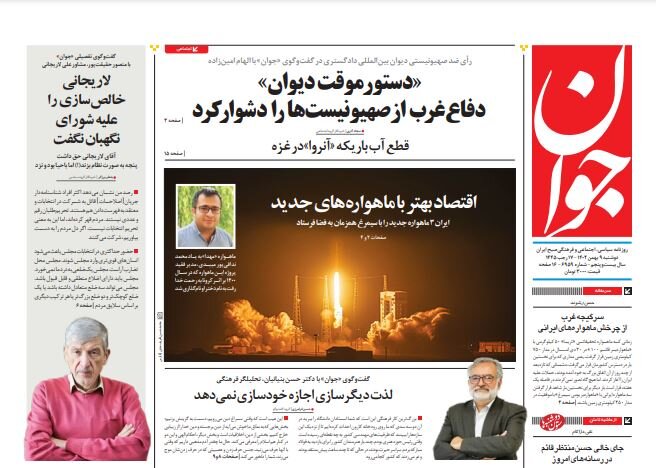TEHRAN PAPERS

TEHRAN - Javan devoted its editorial to the reaction of the West to the successful launch of Iranian satellites and wrote: After the successful launch of the Soraya satellite, the enemies started launching scathing criticism against Iran.
But they had never imagined that they were going to see three Iranian satellites successfully placed in the 450 km orbit of the earth by the "domestic Simorgh satellite carrier" for the first time. Today, with every rotation of Iranian satellites around the earth, American and Western authorities feel more uncomfortable. It is difficult for Western countries, especially the U.S., to see that Iran has made such technological breakthroughs despite four and a half decades of sanctions, threats, and pressure. Such achievements carry this important and strategic message that it is possible to have political independence and make amazing progress in all fields. The American and Western hegemony is being weakened as the world is realizing that it is possible to be an independent country like Iran and enter the space and nuclear club.
Iran: The return of Tehran-Islamabad relations to high levels
In a note, the Iran newspaper analyzed Foreign Minister Amir Abdollahian's visit to Pakistan and said: This trip is a trip that should be considered as the final step in resolving misunderstandings between the two countries. The trip has several meanings, both for the two countries and for the enemies who are incapable of understanding the amicable relations between the two Muslim neighboring neighbors. What caused a short friction in relations between the two countries was a border tension that had arisen over dealing with organized terrorism. When the temporary tension emerged, some countries, especially the Zionist regime and Western powers, welcomed it. Although these countries expected an escalation of border tension, the efforts by senior officials in the two countries, including the Iranian president, helped contain and manage the issue. The immediate moves by Iran and Pakistan to prevent the ill-wishers from fishing in the troubled waters proved to foreigners that relations between Tehran and Pakistan are solid and that Tehran seeks close ties with neighbors.
Hamshahri: Moves intended to hurt Iran's relations with Russia and China
Hamshahri wrote in a commentary: The strengthening of Iran's strategic relations with Russia and China over the past two years has won great attention by the Western political and media circles and caused concerns among American and European decision-makers. It was in such a situation that on the one hand they tried to influence the strategic relations between Tehran and Moscow by exploiting Russia's diplomatic mistake about the three Iranian islands (in the Persian Gulf), and on the other, by raising the suspicion that China wanted Iran to restrain the tension in the Red Sea. In this way, they tried to send a message that the strategic relations between Tehran and Beijing have been affected by the current developments in the region. However, the Russian officials tried to compensate for their mistakes during several meetings with the Iranian officials at different levels, and officials in Beijing also refuted the claim that they had requested Iran to restrain Yemeni attacks on commercial ships in the Red Sea. In fact, both China and Russia continue to take steps toward strengthening multiple bilateral cooperation.
Ettelaat: America in the challenge of deciding to attack Iran
In an analysis, Ettelaat discussed the January 28 drone attack on an American military headquarters on the Jordan-Syria border and the death of three American service members. It wrote: America is in the most difficult decision-making situation and this attack has put it under severe domestic pressure. According to Bloomberg, America is considering the possibility of conducting a secret operation against Iran; one of these possibilities is attacking Iran and not accepting its responsibility, and the other is the possibility of targeting Iranian authorities. An American official said in this regard that Iran's support for the militias that attacked the American base does not mean an attack by Iran. The Islamic Republic of Iran clearly denied interference in this operation and said that the resistance groups in the region do not take orders from Iran, and Iran does not welcome the spread of conflicts in the region. Repeating the baseless accusation against Iran is a conspiracy by those who see their interests in dragging America's feet into a new battle in the region and inciting it to escalate the crisis.

No comments:
Post a Comment